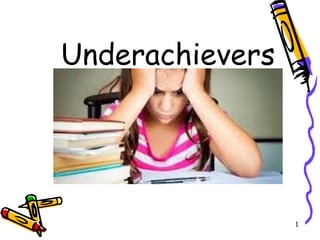
Underachievers
- 3. ‘Underachievement is defined as a discrepancy between a child’s school performance and some index of his or her actual ability, such as intelligence, achievement, or creativity score, or observational data.’ Davis & Rimm 1985 3
- 4. A DISCREPANCY between POTENTIAL (what a child ought to be able to do) and ACTUAL PERFORMANCE (what a child is really demonstrating) Richert 1991 4
- 5. ‘Early identification and appropriate programming prevent the establishment of chronic patterns of underachievement or negative attitudes toward schools; it also allows early intervention with underachievers, which is much more successful than later efforts at remediation or correction. ‘ Whitmore 1980 5
- 6. Identifying gifted underachievers Intelligence test scores Gifted : 2 SD above the mean Achievement test scores A pattern of continuous decline in group achievement test scores Observation Teachers/parents observation checklists 6
- 7. Characteristics of underachievers • See self as inadequate • Expect academic and social failure • Feel helpless to control outcomes of effort • Don’t feel free to make choices • Set unrealistic goals • Are defensive toward authority • Feel rejected and isolated • Are not willing to risk failure • Show ineffective approaches to problems 7
- 8. Shared characteristics that distinguish the achieving from underachieving gifted • Lack of integration of goals & self direction • Lack of self confidence • Inability to persevere • Inferiority feelings • Social immaturity • Emotional problems • Antisocial behavior • Low self concept • An unstable family environment 8
- 9. Underachiever Profiles Dianne Heacox • The Rebel ‘Why should I play the school game?’ • The Conformist ‘Don’t notice that I am smart.’ • The Stressed Learner ‘It’s not good enough.’ • The Struggling Student ‘I just don’t get it.’ • The Victim ‘It’s not my fault.’ • The Bored Student ‘There’s nothing new to learn.’ 9
- 10. Categories of underachievement Rimm 1995 Conformity Dependent conformers Dependent nonconformers Non Dominant Conformers Dominant nonconformers conformity Dependent Dominant 10
- 11. In families of underachievers
- 12. • The student is dependent on the mother • The father is rejecting and domineering and gives little warmth or affection • The relationship between father and daughter or father and son is negative or nonexistent • Parents allows achievement to go unrewarded • The children do not identify with their parents • There are deep social and emotional problems in the family • parents are not active in schools • Parents are not supportive of their children • The child’s achievement present a threat to the parents and their adult superiority • Parents do not share ideas, affection, trust or approval • Parents are restrictive and severe in their punishment 12
- 13. Strategies to reverse underachievement • Supportive strategies Whitmore (1980) These ‘affirm the worth of the child in the classroom and convey the promise of greater potential and success yet to be discovered and enjoyed.’ • Intrinsic strategies These are ‘designed to develop intrinsic achievement motivation through the child’s discovery of rewards available …. As a result of efforts to learn, achieve and contribute to the group.’ • Remedial strategies These are ‘employed to improve the student’s academic performance in an area of learning in which (s)he has evidenced difficulty learning, has experienced a sense of failure. 13
- 14. Focusing on strength – create challenge, variety and opportunity for students to utilize strengths and interests to improve school performance and facilitate indepth learning • Curriculum compacting • Flexible skills grouping • Tiered assignments • Mentorship 14
- 15. Tips for Teachers • Focus on the positive • Keep problems private • Get them involved • Get them interested • Adjust your curriculum • Provide variety • Give them tools / opportunity for success • Make learning appropriate & relevant • Minimize evaluation • Build success • Promote positive self esteem 15
- 16. Pitfalls to avoid • • • • • • • Inflexible teaching Rescuing the student Inappropriate expectations The need to control Getting even Giving up Getting angry 16
- 17. REFERENCES • American Psychiatric Association. (2000). Diagnostic and statistical manual of mental disorders, Fourth Edition, Text Revision. Washington, DC: American Psychiatric Association. • Baum, S. (1990). Gifted but learning disabled: A puzzling paradox . ERIC Digest #E479. Reston, VA: Council for Exceptional Children. • Olenchak, F. R., & Renzulli, J. S. (1989). The effectiveness of the schoolwide enrichment model on selected aspects of elementary school change. Gifted Child Quarterly, 33(1), 36-46.
